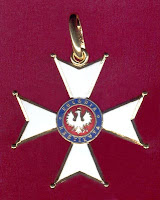Pseudonym: Grot, "Spearhead,"
Stefan Grot-Rowecki
Rowecki was born in Piotrków Trybunalski and was one of the organizers of the secret scouting organization. During World War I he was conscripted into the Austro-Hungarian army and later in to the First Brigade of the Polish Legion. In August 1917 he was interned in after the majority of his unit had refused to pledge loyalty to the Emperor of Austria. He was released in February 1918 from the internment camp in Beniaminów and joined the Polnische Wehrmacht, and after the establishment of the newly independent Poland, he joined the Polish Army.
Rowecki fought in the Polish-Soviet war
World War II
Though Rowecki began organizing the Warsaw Armoured Motorized Brigade ( Warszawska Brygada Pancerno-Motorowa, 7TP, TKS tanks)in June 1939, it did not reach full mobilization when Germany invaded Poland on 1 September 1939. His unit did however take part in the defense of Poland.
After the Polish defeat, Rowecki was able to evade capture and returned to Warsaw. The following month, Rowecki became one of the leaders, then commander (in 1940) of the Związek Walki Zbrojnej. From 1942, he was commander of the Armia Krajowa (Home Army).
In 1941, Rowecki organized sabotage in the territories east of the Polish pre-war borders Wachlarz. On 30 June 1943 he was arrested by the Gestapo in Warsaw and sent to Berlin, then imprisoned at Oranienburg. There he was questioned by many high-ranking Nazi officials including Ernst Kaltenbrunner, Heinrich Himmler and Heinrich Müller. They offered him an anti-bolshevik alliance, but refused. He was in Sachsenhausen
Rowecki's arrest was due to his betrayal by Ludwik Kalkstein "Hanka", Eugeniusz Swierczewski "Genes" and Blanka Kaczorowska "Sroka" who were Gestapo agents. All were members of the Home Army but in fact collaborated with the Gestapo.
 |
| Ludwik Kalkstein "Hanka" |
 |
| Eugeniusz Swierczewski "Genes" |
 |
| Blanka Kaczorowska "Sroka" |
There have been claims circulating that the arrest of Rowecki was the result of a broader intelligence operation at work with the objective of eliminating the top commanders and leaders of the Polish Resistance of the Polish Underground
The Gestapo also arrested the commander of Narodowe Siły Zbrojne (NSZ), Colonel Ignacy Oziewicz on 9 June 1943 and barely a month later, General Wladysław Sikorski died in plane crash under mysterious circumstances. Within a period of two months, the Polish Army had lost three top commanders. The controversy continues to this day.
Medals
Order of the White Eagle, posthumously (11.11.1995)
Virtuti Militari Golden Cross (1942)
Virtuti Militari Silver Cross (1923)
Polonia Restituta IV class
Cross of Valour 8 times, 4 times for Polish-Soviet War and 4 times for Polish Defensive War of 1939
Cross of Merit I class
Cross of Independence
Medal Pamiatkowy za Wojne 1918-1921
Medal 10 lecia Odzyskania Niepodleglosci
Armia Krajowa Cross, posthumously (1967)
Gwiazda Wytrwalosci, posthumously
Legion of Merit Commander, posthumously by Ronald Reagan (USA 9.8.1984)
Légion d'honneur Officers Cross (France 1937)
 |
| Order of the White Eagle |
 |
| Virtuti Militari Golden Cross |
 |
| Virtuti Militari Silver Cross |
 |
| Order of Polonia Restituta |
 | |
| Cross of Valor |
 |
| Cross of Merit 1st Class |
 |
| Cross of Independence |
 |
| Medal Pamiatkowy za Wojne 1918-1921 |
 |
| Medal 10 lecia Odzyskania Niepodleglosci |
 |
| Armia Krajowa Cross |
 | |
| Gwiazda Wytrwalosci |
 |
| Legion of Merit Commander |
 |
| Légion d'honneur Officers Cross |
source: Wikipedia
Recommended Links:
Wladyslaw Sikorski
Home Army and Warsaw Uprising
Editors Note: FYI: The images of medals posted here may or may not be the exact version which was awarded to the recipient. There are several classes for each medal depending on various factors such as type of military (or civilian) service, rank of officer (or soldier), class of award, year in which it was awarded, etc The lack of sufficient information on the web (or omission) has compounded the difficulty in selecting the correct class of medal. I apologize for any inaccuracies.


No comments:
Post a Comment